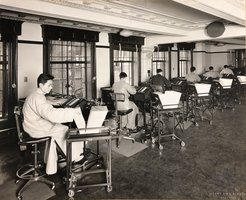Idleness, Industry and Self-Fulfillment
The Ethics and Psychology of Work in Late Imperial and Early Republican China
Marius Oesterheld (PhD Project)

The late Qing and early Republican era (ca. 1895 – 1928) was a period of social upheaval that meant social decline for some and promised upward mobility to others. The claim of literati-officials (Confucian scholars who had passed through the imperial examination system) to political and epistemological power was challenged. Publishing houses mushroomed and countless newspapers and magazines vied for readers. Through rhetoric and imagery the media converted China's precarious economic and geopolitical situation into a cause for personal embarrassment while linking personal success to the project of saving the nation. Against this backdrop, publishers and journalists offered guidance and role models in the guise of various forms of advice literature, in which discussions of work ethics and the meaning of work played a key role. Such texts often reflected the writings of prominent intellectuals such as Liang Qichao, for instance regarding hygiene and national character, but at the same time they were (or at least purported to be) more in touch with their target audience’s experience of everyday life. Some works even incorporated readers’ letters.
The research project examines the conceptual and rhetorical links that advice literature establishes between idleness, industry, mental energy, self-discipline and self-fulfillment. Its main focus is to analyze the semantic fields relevant to the discourse on work and work ethics and identify moments of conceptual change. The conceptual history approach is complemented by a study of work discourse in relation to the development of advice literature as a genre and by an analysis of authors and readership. This twofold contextualization opens up additional lines of inquiry.
How did older morality books (shanshu 善書), which were primarily rooted in Daoism and Buddhism, and Confucian concepts and values (such as jingye 敬業 – "respecting one’s duties") contribute to the discourse around work and work ethics? How influential were translations and non-Chinese figures (e.g. as protagonists of anecdotes)? Which role did positive images of idleness, embodied for instance in the figure of the dandy or the sage hermit, play? To what extent were work ethics used as a tool for constructing and legitimizing status distinctions and stabilizing social order? Which notions of human nature and human emotional needs informed the texts in question? What can advice literature tell us about changes in the relationship between generations and between individuals and society?
In summary, the goal of the project is to situate work within a nexus between self-improvement and national progress, personal happiness and social pressure, moralization and psychologization.
